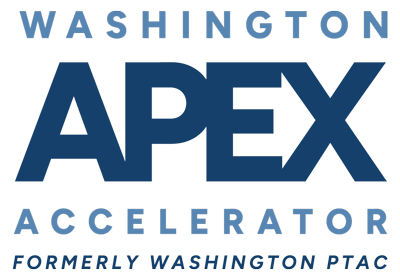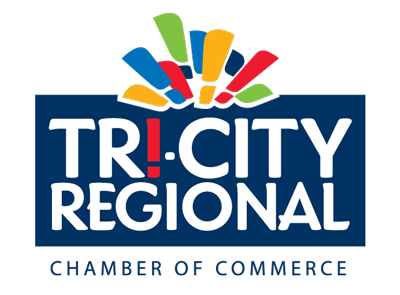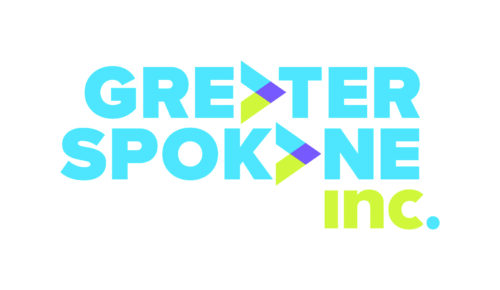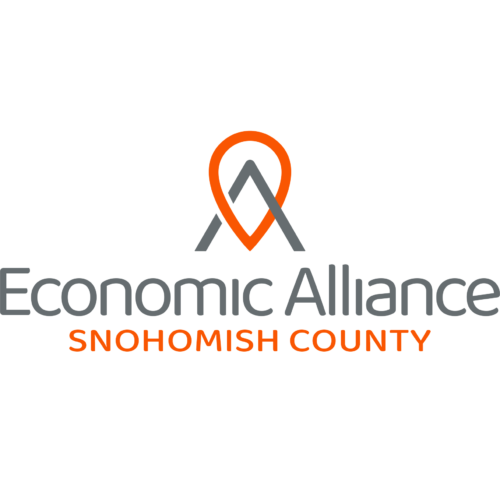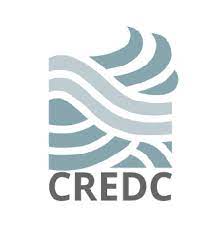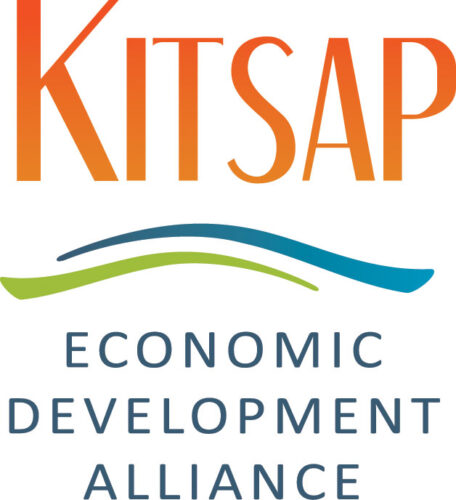The U.S. Small Business Administration (“SBA”) recently announced that the federal government exceeded its small business contracting goal by awarding $132.9 billion dollars in federal contracts – 26.5% of the government’s total procurement spending – to small businesses last fiscal year, with at least an additional $90.7 billion in subcontracts. The SBA recently released statistics in its FY 2019 Small Business Procurement Scorecard, available here and here. Also notable in these reports: (a) for only the second time ever the government met the 5% woman-owned small business goal; (b) the government met the service-disabled veteran-owned small business goal (3%, awarded 4.39%); and (c) the government also met the small disadvantaged business goal (5%, awarded 10.2%). The government did not, however, meet the 3% HUBZone goal, coming in at 2.28%. That said, small business contracting was up across all categories. Here we provide a summary of the SBA’s findings, noting some of the potential opportunities available for small business contractors, while also highlighting some of the risks inherent in doing business with the U.S. government.
Federal Government Small Business Contracting Goals v. Results: Prime Contracts
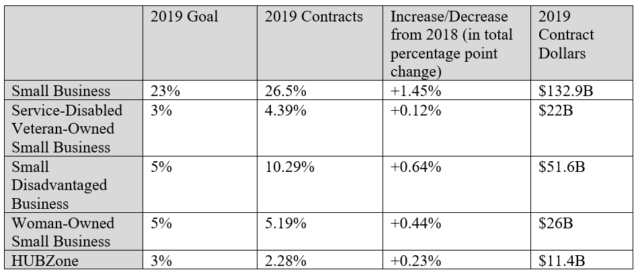
As small businesses continue to take on a bigger share of federal prime contracting dollars, this presents increasing opportunities for small business entrepreneurs to enter the government contracting market. But small business federal government contracting is not without pitfalls for inexperienced (or indeed, even experienced) small businesses.
Furthermore, the spending increases may overshadow the fact that the number of small businesses participating in federal government contracting continues to decrease. There were nearly 11,000 fewer small business government contractors in FY 2019 than in FY 2018. This is likely due, in part, to the recent trend of having fewer, consolidated, larger procurements instead of purchasing in a more piece-meal fashion. While this harnesses savings through economies of scale, it also creates a higher barrier to entry for small businesses, decreasing the number of contracting opportunities available.
Notably, however, the number of service-disabled veteran-owned small businesses have skyrocketed, from 4,275 in FY 2018 to 12,032 in FY 2019. This nearly threefold increase is likely due to specific set-aside opportunities, particularly those at the Department of Veterans Affairs. The number of HUBZone businesses has also increased more than 30%, likely due to the government’s inability to reach its HUBZone goals year after year, and the government’s continued drive to meet this objective.
Federal Government Small Business Contracting Goals v. Results: Subcontracts
Small business subcontracting tells a little bit of a different story. While the government met its overall small business subcontracting goal – encouraging prime contractors to subcontract work to small businesses through a company’s small business subcontracting plan – the only subcategory goal that was met was subcontract awards to women-owned small businesses. Unfortunately, prime contractors did not meet the government’s subcontracting goals for service-disabled veteran-owned small businesses, small disadvantaged businesses, or HUBZone businesses. Indeed, in all subcategories, the reported subcontracting dollars appear to have actually decreased from FY2018. As a result, prime contractors should expect to see increased scrutiny of small business subcontracting plans, particularly as relates to the specialized small business subcategories.
We say that the “subcontracting dollars appear to have decreased.” It is difficult to make any definitive conclusions regarding subcontracting because the government does not always have full visibility into how prime contractors are buying from their subcontractors. The subcontracting data generally is drawn from eSRS.gov, the government’s Electronic Subcontracting Reporting System, which only captures some, but not all, subcontract spending. Thus, in reality, these subcontracting figures are likely higher, although the government does not really have the data to confirm how much higher.
Here are the reported subcontracting numbers:
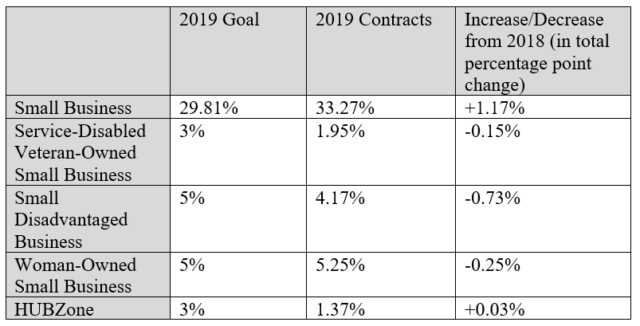
Risks and Potential Pitfalls
While entering a $132.9B marketplace with special preferences afforded to small businesses may present an enticing business growth opportunity, small businesses should take heed. Federal contracts are unique, and qualifying as a small business may not be as simple as it first appears. Small businesses (and especially specialized small businesses like small disadvantaged businesses) must ensure that they qualify according to specific federal laws and regulations. Two areas are worth particular scrutiny:
- Small Business Size and Affiliation: At a threshold level, your business must meet the applicable North American Industry Classification System (“NAICS”) code, which generally will provide requirements regarding the number of employees or annual receipts. (The listing of NAICS codes is available here, and the corresponding size standards are available at 13 C.F.R. § 121.201). Importantly, these figures must include the receipts or employees of the small business as well as its “affiliates.” Thus, it is not enough that the business meet the applicable figures; if a company is “affiliated” with a person, business, or entity, that when combined, exceeds the threshold, then the company fails the test. Generally, affiliation exists when, in light of the totality of the circumstances, an entity controls or has the power to control another or a third party has the power to control them both. An affiliate could be, for example, an owner or part-owner of the entity, a joint venture partner, or a business with which the entity has so many contracts or business relationships that it is economically dependent on that business. How do you know whether “control” exists? It’s a complicated question, and one that the regulations go to great lengths to try and tease out. See 13 C.F.R. § 121.103. But it includes both active control and negative control. If an entity controls a business, then they are likely affiliated.
- Specialized Small Business Requirements: There are a number of subcategories of small businesses that get special preference in certain circumstances, such as service-disabled veteran-owned or woman-owned small businesses. These businesses must comply with specific requirements regarding the ownership and control of the business. It is not enough, for example, for a woman to own the business, a woman must also manage the day-to-day operations of the business and make long-term decisions to qualify as a woman-owned small business. Similar requirements apply to service-disabled veteran-owned small businesses. There is a rebuttable presumption a service-disabled veteran does not control the business if he or she is not located within a reasonable commute of the firm’s headquarters or job sites. As remote-work arrangements continue to expand, this is a requirement many businesses may be quick to overlook.
SBA continues to signal that it takes compliance with its small business regulations seriously. Indeed, on October 15, 2020, SBA will no longer allow woman-owned small businesses to self-certify – these businesses will have to apply for a formal certification (similar to how veteran-owned small businesses are vetted by the government). Violations can result in lost awards, disqualification from federal contracting through the suspension or debarment process, or even civil or criminal penalties. Thus while federal small business contracting may present an enticing business opportunity, small business contractors should ensure they comply with the myriad qualification regulations.
A good rule of thumb: don’t be so eager to get a new award that you avoid asking the hard questions. If you do not understand the small business certification that you are executing, please ask for help. If you do not understand terms like “affiliation” or “control,” please do not bury your head in the sand because the consequences can be severe. While federal government contracting presents viable business prospects, you should proceed with appropriate caution, ensuring that you meet the government’s unique requirements. It is not enough to simply be “small.” And contractors should avoid blindly signing certifications assuming they are compliant (an all too common occurrence). As the newly issued procurement scorecard shows, the federal government offers exciting opportunities for small businesses, as long as you play by the rules.
Syndicated from Sheppard Mullin

